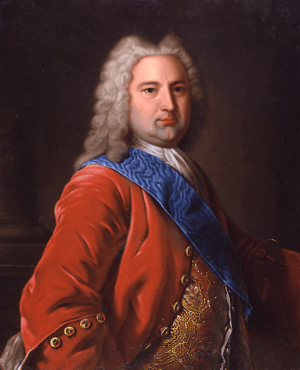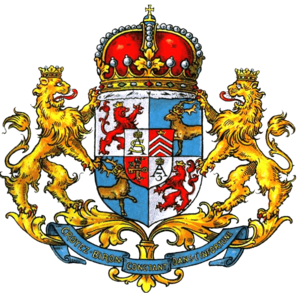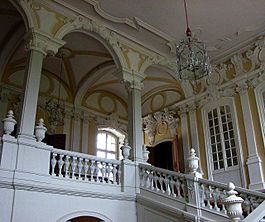Ernst Johann von Biron facts for kids
Quick facts for kids Ernst Johann von Biron |
|
|---|---|
| Duke of Courland and Semigallia | |
 |
|
| Duke of Courland and Semigallia | |
| Reign | 1737–1740 |
| Predecessor | Ferdinand |
| Successor | Council of the Duke |
| Reign | 1763–1769 |
| Predecessor | Charles |
| Successor | Peter |
| Regent of Russia | |
| Regency | 28 October – 20 November 1740 |
| Monarch | Ivan VI |
| Successor | Anna Leopoldovna |
| Born | November 23, 1690 Kalnzeem, Semigallia, Courland and Semigallia |
| Died | December 29, 1772 (aged 82) Mitau, Courland and Semigallia |
| Burial | Ducal crypt in the Jelgava Palace |
| Spouse |
Benigna Gottlieb von Trotha gt Treyden
(m. 1723) |
| Issue |
|
| House | Biron |
| Father | Karl von Biron |
| Mother | Catharina Hedwig von Raab gt Thülen |
| Religion | Lutheranism |
Ernst Johann von Biron (born November 23, 1690 – died December 29, 1772) was an important figure in 18th-century European history. He served as the Duke of Courland and Semigallia twice, first from 1737 to 1740, and again from 1763 to 1769. For a short time in 1740, he was also the regent of the Russian Empire, meaning he ruled Russia for a young emperor.
Contents
How Ernst Johann von Biron Started His Career
Ernst Johann von Biron was born in Kalnciems, a place in Semigallia, which was part of the Duchy of Courland and Semigallia. He was the second son of Karl von Bühren and Katharina Hedwig von der Raab genannt Thülen. His family was not very rich or famous. His grandfather worked for the Duke of Courland and received a small piece of land.
Biron went to school at an academy in Königsberg. However, he was asked to leave because of his bad behavior. In 1714, he decided to try his luck in Russia. He tried to get a job with Princess Charlotte of Brunswick-Lüneburg, who was married to the Russian Tsarevich. But he was not successful.
After failing in Russia, Biron returned to Mitau in Courland. His sister worked as a lady-in-waiting for Anna, who was the regent of Courland at the time. Through his sister, Biron met Anna's main minister, Peter Bestuzhev. Biron got a job at Anna's court.
Later, Biron managed to become more important than Bestuzhev. He even caused Bestuzhev and his family to lose their positions and be sent away. From then on, Biron had a very strong influence over Anna. This influence grew even more when Anna became the Empress of Russia.
Biron's Time Ruling Russia
In 1723, Biron married Benigna Gottlieb von Trotha gt Treyden. She was a lady-in-waiting to Regent Anna and came from a noble family in the Baltic region. Some people say Anna arranged the marriage to hide her own close relationship with Biron. However, their marriage was happy, and Benigna was very loyal to Biron. She stayed with him even during his long exile in Siberia after Anna's death.
Biron and Benigna had three children: a son named Peter, another son named Karl Ernst, and a daughter named Hedvig Elizabeth.
In 1730, Anna became the Empress of Russia. Biron and his wife moved to Moscow with her. They both kept their important roles at court and received many honors and much wealth. At Anna's coronation, Biron was given a high position called Grand Chamberlain. He also became a count and received a large estate with a lot of income. It was around this time that his name began to be written as 'Biron' instead of 'Bühren'. He even adopted the coat of arms of a French noble family named Biron, even though he was not related to them.
The Council of the Empire tried to limit Empress Anna's power. But Anna chose to rely only on Biron. He became very powerful and was practically the ruler of the Russian Empire. His influence over the empress was very strong. People who opposed Biron often lost their positions or were sent away. This period in Russian history is sometimes called the Bironovshchina or the "German yoke" by Russians, because Biron was seen as a foreign ruler.
Despite his unpopularity, Biron was a skilled administrator. He helped keep order in the empire. This was important because the main royal family line had ended, and the empress did not have children or clear heirs.
During the later years of Anna's rule, Biron became incredibly wealthy and powerful. His living quarters in the palace were next to the empress's. His belongings and carriages were almost as grand as hers. He owned many estates and had a special department just for his horses.
Becoming Duke of Courland and Semigallia
A major event in Biron's life happened in June 1737. The ruling family of Courland, the Kettlers, had no more heirs. The nobles of Courland had to choose a new duke. Empress Anna strongly suggested that Biron should be elected.
Biron was not very popular in Courland. The nobles did not want him to rule over them because he was seen as an upstart. However, they could not easily go against the empress's wishes. Large sums of money were secretly sent to Courland to persuade the electors to choose Biron.
There was another problem: the Duchy of Courland and Semigallia was claimed by both Poland-Lithuania and Russia. Russian armies helped place Augustus III of Saxony on the Polish throne. In return, Augustus III promised that Biron would become the Duke of Courland and Semigallia. Other European rulers also agreed to this. Biron officially became the Duke in 1739 in Warsaw.
Biron's Fall from Power
At first, Biron seemed humble when he gained power. But towards the end of Anna's reign, he became very proud and bossy. This behavior, along with the harsh punishment of a former friend, made Biron disliked by almost everyone in Russia.
On her deathbed, Empress Anna reluctantly named Biron as regent for the young Emperor Ivan VI of Russia. She hoped this would protect him from his enemies. On October 26, 1740, many important Russian officials signed a document making Biron the regent.
Anna died on October 28. Biron's time as regent lasted only three weeks. On November 19, 1740, he was arrested in his bedroom by his old rival, Field Marshal Münnich. A special group was formed to judge Biron. They sentenced him to death. However, the new regent, Anna Leopoldovna (Ivan VI's mother), changed his sentence. Biron was sent away for life to Pelym in Siberia. All of his huge wealth was taken away.
Soon after, another change in power happened in Russia. The new empress, Elizabeth Petrovna, sent Münnich away and allowed Biron to live in Yaroslavl.
Later Years and Return to Power
For 22 years, Biron lived quietly and was not involved in major historical events. He briefly returned to public life in 1762 when Peter III of Russia called him to court. In 1763, Catherine II of Russia restored him to his position as Duke of Courland.
Biron ruled Courland again until 1769, when he gave the duchy to his son, Peter. His final years as ruler were fair and even kind, though he still ruled with strong authority. Ernst Johann von Biron died in Mitau, his capital city, on December 29, 1772. His wife, Benigna, who had been with him through all his ups and downs, died ten years later. His son, Peter von Biron, became the next Duke of Courland.
See also
 In Spanish: Ernst Johann von Biron para niños
In Spanish: Ernst Johann von Biron para niños
- Robert Nisbet Bain, The Pupils of Peter the Great (London, 1897)
- Christoph Hermann von Manstein, Memoirs (English edition, London, 1856)
- Claudius Rondeau, Diplomatic Dispatches from Russia (St Petersburg, 1889–1892).
- Edgardo Franzosini, Il mangiatore di carta (Milano:SugarCo) 1989
- Игорь Курукин, Бирон. Moscow, Molodaia Gvardiia, 2006. ISBN: 978-5235027404.
 | Aurelia Browder |
 | Nannie Helen Burroughs |
 | Michelle Alexander |



